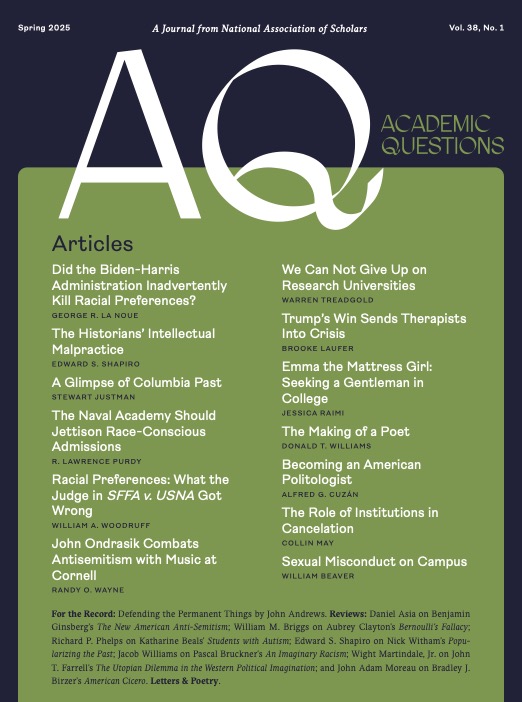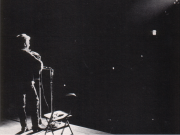The Utopian Dilemma in the Western Political Imagination, John T. Farrell, Routledge, 2023, pp. 236, $55 paperback.
John Farrell may be one of our most perceptive observers of today’s intellectual insanity.
He began with Freud’s Paranoid Quest, Psychoanalysis and Modern Suspicion (1967), and continued with Paranoia and Modernity, Cervantes to Rousseau, (2006). This was followed by The Varieties of Authorial Intention, Literary Theory Beyond the Intentional Fallacy (2017), which examined deconstruction and the scholarly paranoia and suspicion that has left intellectuals with no resources for defending the value of the humanities.
Now he offers The Utopian Dilemma in the Western Political Imagination (2023), an exhaustive review of eighteen political utopias and dystopias beginning with Homer and Diogenes, carrying on through Huxley and Orwell, and concluding with Anthony Burgess’ horrifying Clockwork Orange.
This is a brilliant, exhaustive, and challenging study—painfully relevant today. Farrell points out that while political utopias are designed to short-circuit the foibles of human nature, the more traditional honor-based culture defends the need for personal and collective dignity. These proponents ask the utopian, do we really want a world without struggle, without heroes, and without the stories they create?
Modern utopians believe that happiness can belong to everyone—and their rules should prevail.
Aristotle explored this question with his four forms of government—the king, the landed aristocracy, the commercial elite, and pure democracy of the people. The inverse of the good king is the tyrant, the worst form of government. He also recognized that pure democracy—impulsive and unguided—usually fails and will be replaced by the tyrant. In his world there can be no utopia.
Of course the desire persists. Farrell quotes Oscar Wilde: “A map of the world that does not include Utopia is not worth glancing at, for it leaves out the one country in which Humanity is always landing.”
All of Farrell’s books, in some way, challenge the authority of intellectuals—a danger that goes as far back as the story of Adam and Eve in the garden, with the temptation to make men like God. It equated defiance of God’s will with power.
The British historian Paul Johnson’s Intellectuals (1988) likewise looks at a dozen such figures, beginning with J.J. Rousseau “an interesting madman,” whose Discourse on the Origins of Inequality argues that competition is evil, corrupting mankind’s inborn communal sense, and his book concludes with Lillian Hellman.
Farrell moves thoughtfully through early classic utopian and dystopian works: Thomas More, Jonathan Swift, Rousseau and Adam Smith, but his final chapters lead up to a discussion of Duke University’s celebrity Marxist, Frederic Jameson and his “American Utopia” (2016), in which Jameson puts forward the U. S. Army as the unifying overseer of national benefits, having eliminated its martial mission.
Throughout Farrell’s studies we see that the goal of the utopian is to eliminate competition of all kinds under the watchful eye of the state. This is a world without heroes which sees money entering into every relationship, distorting choices of love and profession without bringing happiness.
It is significant that the last eleven chapters, out of a total of eighteen, begin with Karl Marx. This battle of the intellectual to comprehend and manage the shifts has become a largely modern phenomenon.
For H. G. Wells (1895) it had been the imagined invasion of England by Martians (The War of the Worlds), followed by travel into the far-distant future in The Time Machine. Wells pinned his hopes on technology and a political system in which people would be governed not by the whims of democratic masses and their flatterers but by an elite core of experts.
For the novelist Charlotte Perkins Gilman (1860-1935) women should naturally want to displace the unjust, irrational, and destructive culture of men: for her utopia is female, dystopia is male.
Aldous Huxley provided this male dystopia in Brave New World (1931). The intellectual elites (which included Huxley) feared that the masses would be manipulated by dictators and demagogues. Thus, following the psychologists Pavlov and Freud, he decided that the people needed stability above all else, which led him to eugenics and tireless propaganda.
George Orwell (a.k.a Eric Arthur Blair) followed this with Animal Farm (1945) and 1984 (1949), two tales of dystopian socialism.
For all Europe this was a dismal time. W. B. Yeats wrote “The Second Coming” in 1919. T. S. Eliot published The Waste Land in 1922. Europe was to suffer through 40 years of depression and war, the rise of numerous dictatorships, followed by the dislocations of spectacular economic growth, air travel, social readjustments required to deal with race, class and gender inequities, the success of huge corporations, and the rise of America at the expense of Europe. All of this was happening without the guidance of Europe’s intellectual and artistic community. The utopians had good reason to feel left out.
Farrell does not include any of the mythmaking utopias of King Arthur in his book because they have a religious and magical character. They are not political in the deepest sense, and all utopians are political.
We wind up with the grandest of all utopian cultures in the epic poetry of Homer in The Iliad. Here we find a heroic-aristocratic culture in which battles are not fought simply for victory, but for honor. When Achilles is denied Briseis, the Trojan woman he took as his concubine, he simply refuses to fight. In this culture, inequality is its reason for being. Poets become the bearers of fame and memory.
Needless to say, Athenians quickly realized such a culture is impossible to manage. Achilles was replaced with Socrates. Athenian tragedies became the forum in which Athenians could explore the tensions between their Homeric heritage and the practical demands of city life. Plato’s utopia was to be managed by an elite guardian class with stability as its key virtue. His ideal city would have neither heroes nor tragedies.
But while Plato was a revolutionary against the state, Aristotle was the great confirmer of the natural order. His polis is centered on the middle class, which he believed was most likely to behave reasonably. He also recognized that depriving citizens of private property would also deprive them of the opportunity to be generous. Aristotle was not looking for an ideal unity, but a dynamic balance of disparate interests. Nor was he a pessimist.
Aristotle was a realist, and I suspect Professor Farrell agrees. Unlike the utopians and dystopians he writes about so well, Farrell would probably conclude with Aristotle that people are fundamentally social creatures and incurably competitive. The appeals of the heroic life will not go away.
Wight Martindale, Jr. has been an adjunct professor in the Honors Program at Villanova University; [email protected]. A former vice president at Lehman Brothers, he is the author of Inside the Cage: A Season at West 4th Street’s Legendary Tournament (Simon and Schuster, 2005) and Don Quixote Goes to College: From the Trading Floor to the Classroom, A Memoir on Education (privately printed, 2013). He last appeared in these pages with “Why Americans Destroy Their Own History,” (Fall 2022).














